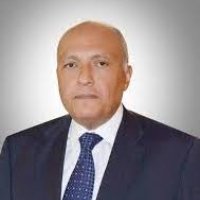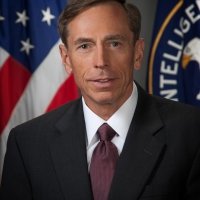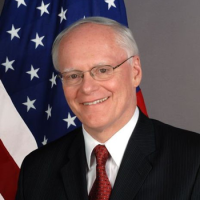Assessing Regional Dynamics: The View from Egypt - A Conversation with Foreign Minister Sameh Shoukry
This discussion with H.E. Sameh Shoukry, the Foreign Minister of Egypt, covered developments in the Middle East and North Africa region, which are of vital national security interest to both the United States and its partner Egypt.
Egypt continues to play a central role upholding regional security in the MENA region, from its diplomatic efforts in Libya to the Palestinian-Israeli front particularly in Gaza, and on its important role in founding the Eastern Mediterranean Gas Forum. Despite a few challenges, the US and Egypt’s strategic partnership is one that has evolved over time, serving the interests of both countries in a robust and vigorous manner.
Key Takeaways
- Egypt continues to play a critical role in the region as a strategic partner to the United States. This year, in particular, Egypt's diplomatic efforts in brokering the Gaza ceasefire between Israel and Hamas, and its role in supporting the political solution to the conflict in Libya, demonstrates its commitment to peace and security in the MENA region.
- Egypt sees the role and involvement of the United States in the MENA region as fundamental for maintaining regional stability and security and for the advancement of peace. While there are opportunities to engage with new priorities elsewhere, U.S. national security interests are not served well with a total relinquishing of its traditional role in the MENA region.
- Egypt's strategic dialogue with the United States includes discussions on Egypt’s human rights record, which has been a source of tension with the Biden administration. Egypt's view is that through healthy and productive dialogue with the United States and other key international partners, the country can continue to build capacity and learn from best practices in order to guarantee the rights of the Egyptian people.
Selected Quotes
James F. Jeffrey
“I’m convinced, and I hope that it’s the message you will get from everybody here in Washington, that the United States will continue to remain in the region and play the positive role that it has generally played over the past 40 years. But it will have to do so in a different way than in the recent past, with more reliance upon its partners and allies. And Egypt, given your size, importance, location, and history, also as the first Arab state that truly engaged with us on a variety of security questions right after the 1973 war, is really a pioneer in this regard. The more we can work by, with, and through you, I think the more you’re going to have a productive relationship with us, trying to do exactly this peace and stability that we are all looking for in the region.”
Sameh Shoukry
“I think it's challenging, not only for Egypt, but for Africa in general and the African Union. Egypt, being a part of the Bureau of the African Union, had the opportunity on several occasions to address this issue: to apply politically toward our partners in Western Europe and the United States for a more equitable distribution in recognition of the need to provide vaccines more readily [and] to establish production facilities on the continent. We currently do have production facilities. We have a strong pharmaceutical infrastructure, and thereby it can provide South Africa, and potentially Nigeria and Senegal, the establishment of production facilities that can cover probably the needs of the continent. But, the commercial, the contractual, and the legal issues that revolve have made this an extended process, and we hope that it will give more speedy results. The pandemic will never be contained except if we are all on the same page and apply ourselves in a cooperative manner. So, you are not going to be able to isolate the United States or Western Europe as long as there is air travel and the interconnectivity in the world if we are not all free of the pandemic, then it will never end.”
“Well, it certainly is despicable, the attempt on Prime Minister Kadhimi’s life. It does highlight again the fragility and the volatility of the situation in Iraq and the need to address all of the challenges, especially the potential challenges of non-state actors and terrorism on Iraqi soil. But we have more than a dialogue with Iraq; we have an ongoing mechanism of cooperation [and] a trilateral mechanism of cooperation between Egypt, Jordan, and Iraq. It is mainly focusing on areas of economic cooperation. Iraq is in need of support and reconstruction after the devastation of the fight against terrorism and the Islamic State, and also it is a manner of, again, reintegrating Iraq into its natural regional configuration as an important partner in maintaining Arab national security. We will do everything possible both politically and economically to support Iraq in its evolution towards democracy, stability, and reintegration in into the other fold. And this is not solely a matter than Egypt and Jordan have undertaken, but also being supported by many of our partners in the Gulf who are now increasing the level of their cooperation and support of Iraq.”
“Egypt has a very sensitive situation when it comes to Sudan, our long history, and thereby we have always made it a point to indicate that we respect the will of Sudanese people and we do not intervene in any way in Sudan to support one segment in contrary to any other. I think whatever is developing in Sudan is a matter for the Sudanese to address, we can only encourage their stability and security. That process towards achieving elections, democracy, [and] the transitional period, should all be respected by all sides and that there should be a negotiated resolution of the situation in conformity with a dialogue that exists among all of the stakeholders. We will continue to, of course, do everything possible to achieve the stability and security and whatever is required of us. We have provided a great deal of assistance, both economic and humanitarian, during this last period, and we continue to monitor the situation. But certainly not to intervene or to do anything that would be construed by any side as being partial.”
Speaker

Introduction

Moderator

Former ambassador to Iraq and Turkey, and Special Envoy to the Global Coalition To Defeat ISIS
Hosted By

Middle East Program
The Wilson Center’s Middle East Program serves as a crucial resource for the policymaking community and beyond, providing analyses and research that helps inform US foreign policymaking, stimulates public debate, and expands knowledge about issues in the wider Middle East and North Africa (MENA) region. Read more
